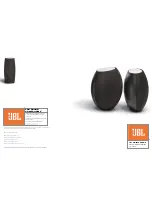
Page: 7
Practice of sound / Installation and placement tips
This chapter contains common information on
loudspeaker placement and installation.
This is general rules, so there are exceptions of
some rules
In which room do
you achieve the best
sound?
No matter how good the equipment is, in the wrong
listening environment it will inevitably sound bad.
There are some basic rules concerning a proper
loudspeaker installation:
Reflections
Carpets, curtains and soft furniture absorb mid
range and high frequency sound, and this is
preferable. Big empty areas, on the contrary,
produce hard reflections that may lead to a blurry
dialogue. Apart from colouring the sound, the
perspective
of
the
sound
will
deteriorate.
Reflections in the room can roughly be compared to
the reflections that cause ghost pictures on a TV
screen.
Amplification of bass
frequencies
A loudspeaker that is placed near a wall, ceiling or
floor will amplify lower frequencies in a sometimes
not desirable way (since it may lead to an indistinct
sound reproduction). This amplification becomes
even more obvious if the loudspeaker is placed near
a corner. Thus, for a sound as clear as possible, the
loudspeaker should be placed at least 30 cm (about
12 inch) away from the wall.
Some constructions are made to be placed close to
a wall.
Furniture
Be aware that furniture may vibrate and cause
noise at high levels.
Room dimension
Quadratic rooms or rooms where the length is near
twice as long as the width should be avoided, since
they may create unwanted resonance.
Placement of the
subwoofer
The placement of the subwoofer in the room
dramatically affects the overall frequency response
and sound level of the system. At low frequencies
the effect of the room is strong. Even a slight
change in the subwoofer's location can make a
significant difference in the frequency balance.
Patience and experimentation is needed to find the
optimal placement. The placement affects the
phase difference between the main loudspeakers
and the subwoofer.
One basic rule is to place the subwoofer together
with or near the front system (especially important
if the front loudspeaker also covers bass
frequencies) as this will minimize the risk of phase
errors in the room.































